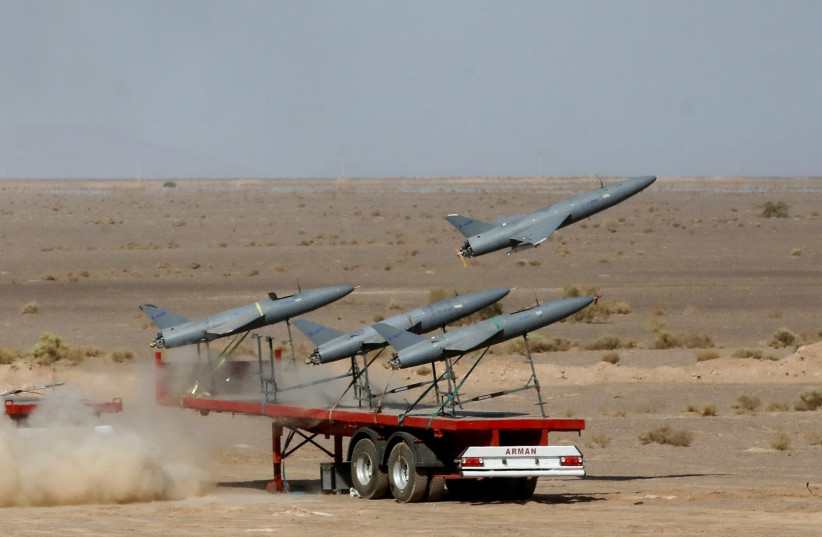Israel should continue to adopt this Octopus Doctrine and work with our friends and partners abroad to raise the alarm about how Iran’s threats to Israel are also threats to the world.

Talk of an Iran deal continues, but such a deal appears increasingly unlikely, at least in the short term.
At the same time, Mossad Director David Barnea indicated this week that Israel will respond to Iran directly if Iranian-backed groups attack Israel or Israelis.
“The Iranian leadership must understand that attacks against Israel or Israelis, directly or indirectly by proxies, will be met with a painful response against those responsible, on Iranian soil,” Barnea warned during a rare speech at the ICT Herzliya conference.
“The Iranian leadership must understand that attacks against Israel or Israelis, directly or indirectly by proxies, will be met with a painful response against those responsible, on Iranian soil.”
Mossad chief David Barnea
The comments indicate that the Iranian leadership needs to understand its attacks against Israel, or Israelis abroad, will not go unpunished. This doctrine, however, is not new and was actually spelled out by former prime minister Naftali Bennett in June, when he said Israel was “implementing the Octopus Doctrine… We no longer play with the tentacles, with Iran’s proxies. We’ve created a new equation by going for the head.”

Octopus Doctrine against Iran means tensions will increase
Two trends – the decision by Israel to implement an Octopus Doctrine of targeting Iranian planners of attacks, as well as the decision by Iran to continue to ignore its obligations under the 2015 Iran deal – mean that tensions in the region will increase.
We are already seeing the global threat that Iran poses. Iran has shipped drones to Russia, and Ukraine has claimed it shot down one of those drones this week. Iran has also engaged in cyberattacks on Albania. This illustrates how Iran is not only a close ally of Russia, but it is increasing the size of its cyber and drone threats.
In Israel, our view is that Iran must be deterred from a breakout that would lead to a nuclear weapon. At the same time, we want Iran’s proxies to be deterred. The Iranian proxy network has grown in recent years. Hezbollah today possesses a large arsenal of missiles and other weapons, such as drones. Iranian-backed groups in Syria threaten Israel and US forces. Iranian proxies in Iraq and Yemen also threaten Israel and the wider region.
Israel must always be prepared to take matters into its own hands. We have known this since the dawn of modern Zionism. However, the threats are different today than in 1948. Today, we face a complex Iranian adversary. Iran does not possess a large conventional army. We don’t need to send the Armored Corps to do tank battles like in 1967. On the other hand, Iran is not similar to a Palestinian terrorist group. We cannot use counterinsurgency methods against Hezbollah or Iranian entrenchment in Syria.
Israel has resorted to what is called the Campaign Between the Wars for the last decade to contend with Iran’s growing role in Syria. Recent airstrikes on airports in Damascus and Aleppo, which the Syrian regime blamed on Israel, illustrate a sense that Iran is continuing to traffic weapons via key Syrian airports.
The Octopus Doctrine potentially gives Israel a way out of the Whac-A-Mole strategy in Syria. Iranian members of the Islamic Revolutionary Guard Corps and other forces must know they cannot continue to attack Israel or plot against Israelis abroad. Iran has tried to cook up numerous plots, especially in Turkey, in recent years. Thwarting those plots is important, but Iran also has to pay a price.
Israel should continue to adopt this Octopus Doctrine and work with our friends and partners abroad to raise the alarm about how Iran’s threats to Israel are also threats to the wider region and the world.
How does Iran threaten the world?
Iranian drones were used against Israel, but now they are making their way to Venezuela, Ethiopia and Russia. Iran’s cyberattacks targeted Israel, but now they target members of NATO. Iran’s assassins are threatening dissidents across Europe. Iran has attacked commercial ships in the Gulf of Oman.
For too long the Tehran regime has had a kind of impunity. Some of this impunity is due to its ability to hold up a possible deal over its nuclear program as a kind of blackmail. Iran asserts that if anyone confronts Tehran, then the likelihood of a deal will be reduced.
However, it now appears Iran has soured on the deal anyway and is trying to wring more concessions. This should illustrate that Iran is not a trustworthy country to be negotiated with.
Israel’s apparent policy of targeting Iran’s proxies and allies that are doing its bidding against the Jewish state is a sound one that is helping to keep the threat from Tehran at arm’s length.
Content retrieved from: https://www.jpost.com/opinion/article-717165.